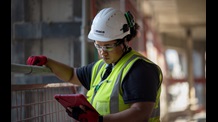Mais Lecture: What’s good for construction, is good for our economy
Last week, Rachel Reeves gave the Mais Lecture which gave us the clearest insight yet into what Labour’s economic plan for the country would be, should they be successful in the next general election.
Of particular note to the Construction Industry were sections on stability & securonomics, Industrial Policy and a new deal for working people.
Stability & securonomics
The Shadow Chancellor recognised the shocks the UK economy has suffered in recent years - including the Covid-19 pandemic, Russia’s war in Ukraine and the Liz Truss era - and she knows she needs to set out a path to stability to restore GDP growth.
For construction, her solution is very palatable – stability and certainty.
Reeves claimed that ‘short-term instability inhibits investment and drives up infrastructure costs, resulting in fewer, and smaller, new capital projects’. We know from the Construction Leadership Council’s (CLC’s) report, ‘Creating a Productive Environment for UK Construction’, that current levels of instability coupled with challenges in the planning system are costing the UK Construction sector over £11bn per year. It’s therefore very welcome that the Shadow Chancellor is listening - even going so far as to say that ‘our planning system [is] the single greatest obstacle to our economic success’.
Before we get carried away with the potential for a new golden age of infrastructure… the other side of stability is responsible fiscal policy, and organisations such as the OBR who Govern them.
We know there is still going to be very limited capital investment for future infrastructure projects. We are already expecting cuts to public sector revenue budgets following Jeremy Hunt’s Budget - with a big focus on Public Sector Productivity. With the cuts all but inevitable, Reeves looks set to focus on productivity and not extra spend.
Maximising what we can from any ringfenced central investment will become a much clearer theme for our projects and clients - and we might finally get a realistic Infrastructure and Construction Pipeline that we can believe in, albeit likely smaller than desired.
Industrial policy
Reeves says that ‘a growth model reliant on geopolitical stability is a growth model resting on increasingly shallow foundations’. The state’s role in shaping a market economy has been fairly static - and hands off - under Governments of both colours, for over 30 years. Recent forays into Industrial Strategy have all been light touch when considered globally, such as what President Biden is doing in the US.
Should Labour win the next election, things may change, with the state’s role likely to increase.
The theory is to create a more attractive place for overseas investment, increasing the quantum of investment given current fiscal challenges. By highlighting the UK as a productive place in which to do business, the Government can make sure that investment is spent in a way that enhances UK jobs, UK owned businesses and UK IP.
The Reeves vision seems to be to shape the UK economy by putting the full force of the state behind it – think tax incentives, R&D funding and newly released legislative freedoms from things like state aid in areas where they want to partner with businesses.
For example, defence spending may well be protected - if not increased - in the UK, bringing it in line with the rest of the western world, or at least closer to what might prove acceptable to a Trump Presidency. More interesting might be how industrial policy could grow sovereign capability by boosting UK manufacturing capability to support our military. By positioning defence as central to overarching economic growth, the dial is moved from the current position where it is simply seen as necessary spending in order to protect the realm. Combining priorities means we are getting more for less. The other areas which received a passing mention for this refreshed approach to investment were professional services, life sciences and renewable energy.
A new deal for working people – higher productivity, higher wages
Reeves expressed a desire for enhanced productivity efforts to be reflected in wages and employment terms for employees. This comes with some commitments on wider workers’ rights such as protection from unfair dismissal, sick pay, and parental leave. However, probationary periods would remain so as to avoid disincentivising businesses from recruiting.
Labour says it would also ban zero hours contracts. While far more prevalent in other sectors, such as hospitality, we could reasonably expect a shift towards direct employment, supply chain development and enhancing the skills and competencies of the UK Construction workforce.
It is fair to say that Labour’s Mais Lecture started laying the foundations for a productive construction industry - and provided much food for thought for those wanting to look more closely at preparing businesses for the future.
Opinion piece by Hannah Vickers, Chief of Staff, Mace.
First published in Construction News.











